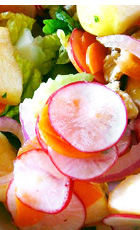Anopsology
Anopsology[edit | edit source]
Anopsology, a nutritional theory introduced in 1964 by Guy-Claude Burger, promotes the belief in an intrinsic nutritional instinct in humans. This instinct is believed to align food intake with nutritional needs via sensory pleasure derived from raw foods. The term originates from the Greek words: αν (an-) meaning "not", ὄψον (opson) meaning "prepared dish", and λογία (-logy) signifying "theory". Hence, anopsology translates to "the theory of primitive nutrition". While "anopsology" pertains to the theory, "instinctive nutrition" describes the dietary practice, and "instinctotherapy" focuses on the therapeutic aspects. The term should not be mistaken for "anopsy", which denotes blindness.
Hypotheses[edit | edit source]
Central to anopsology is the postulate that humans are genetically predisposed to consume 'original' foods. These refer to foods accessible to early human ancestors over millions of years.
Theory[edit | edit source]
Adherents of anopsology, often termed "Instinctos/Anopsologists", emphasize the significance of raw foods, arguing that human evolution thrived on unprocessed, uncooked sustenance found in nature. As quoted by Frederick Mann: "The human body evolved over millions of years breathing, drinking, and eating what it found in nature as it was found in nature. Evolution 'designed' the human body to survive best on what it found in nature." They generally avoid Neolithic foods, including raw dairy products, cereals, and legumes.
Smell and Taste[edit | edit source]
Guy-Claude Burger proposes that the 'food instinct' operates on the principle of gustatory alliesthesia. This suggests that food-derived pleasure is contingent not only on its inherent quality but also on the body's current nutritional state. Consequently, the olfactory and gustatory senses can reflect physiological requirements, guiding appropriate dietary choices. This theory implies that foods smelling and tasting pleasant are beneficial or essential, and the opposite holds true. As a person consumes an adequate quantity of a particular food, its taste becomes less appealing. Wild-type foods, as opposed to cultivated varieties, are believed to exhibit more noticeable taste variations.
Origin[edit | edit source]
Guy-Claude Burger's encounter with lymphoblastic sarcoma, a cancer variant, prompted the conception of anopsology. After learning of his slim survival chances post-radiation therapy, Burger resorted to a raw-food regimen. His cancer unexpectedly went into remission, leading him to ascribe his recovery to this dietary shift. This epiphany inspired Burger to delve deeper into raw-food consumption, subsequently championing its benefits to others.
Credibility[edit | edit source]
The therapeutic merits of anopsology remain contested. Predominantly anecdotal evidence makes it challenging to ascertain its efficacy conclusively. While some individuals credit anopsology for enhanced health, comprehensive scientific studies validating these claims are scarce.
Anopsology in Comparison to Other Diets[edit | edit source]
Anopsology doesn't strictly align with vegetarian principles. In fact, it endorses the consumption of raw or dried meats, akin to beef jerky. Burger negated the vegetarian paradigm, asserting that ancestral human diets weren't exclusively plant-based. Hence, anopsology deviates from vegan diets. However, it shares similarities with the Raw Paleolithic diet.
Cooking and anopsology[edit | edit source]
Advocates opine that cooking could diminish potential anti-cancer compounds and erode medicinal properties. Heating, especially baking, might compromise vital nutrients, while boiling could potentially undermine the medicinal attributes of food.
| This article is a medical stub. You can help WikiMD by expanding it! | |
|---|---|
| Human nutrition and healthy diets | ||||||||||||||||||||||
|---|---|---|---|---|---|---|---|---|---|---|---|---|---|---|---|---|---|---|---|---|---|---|
: Diet : Dieting : Cuisine : Dietitian : Hunger : Leptin : Meal : Nutrition : Obesity : Staple food
|
Search WikiMD
Ad.Tired of being Overweight? Try W8MD's physician weight loss program.
Semaglutide (Ozempic / Wegovy and Tirzepatide (Mounjaro / Zepbound) available.
Advertise on WikiMD
|
WikiMD's Wellness Encyclopedia |
| Let Food Be Thy Medicine Medicine Thy Food - Hippocrates |
Translate this page: - East Asian
中文,
日本,
한국어,
South Asian
हिन्दी,
தமிழ்,
తెలుగు,
Urdu,
ಕನ್ನಡ,
Southeast Asian
Indonesian,
Vietnamese,
Thai,
မြန်မာဘာသာ,
বাংলা
European
español,
Deutsch,
français,
Greek,
português do Brasil,
polski,
română,
русский,
Nederlands,
norsk,
svenska,
suomi,
Italian
Middle Eastern & African
عربى,
Turkish,
Persian,
Hebrew,
Afrikaans,
isiZulu,
Kiswahili,
Other
Bulgarian,
Hungarian,
Czech,
Swedish,
മലയാളം,
मराठी,
ਪੰਜਾਬੀ,
ગુજરાતી,
Portuguese,
Ukrainian
Medical Disclaimer: WikiMD is not a substitute for professional medical advice. The information on WikiMD is provided as an information resource only, may be incorrect, outdated or misleading, and is not to be used or relied on for any diagnostic or treatment purposes. Please consult your health care provider before making any healthcare decisions or for guidance about a specific medical condition. WikiMD expressly disclaims responsibility, and shall have no liability, for any damages, loss, injury, or liability whatsoever suffered as a result of your reliance on the information contained in this site. By visiting this site you agree to the foregoing terms and conditions, which may from time to time be changed or supplemented by WikiMD. If you do not agree to the foregoing terms and conditions, you should not enter or use this site. See full disclaimer.
Credits:Most images are courtesy of Wikimedia commons, and templates, categories Wikipedia, licensed under CC BY SA or similar.
Contributors: Prab R. Tumpati, MD





